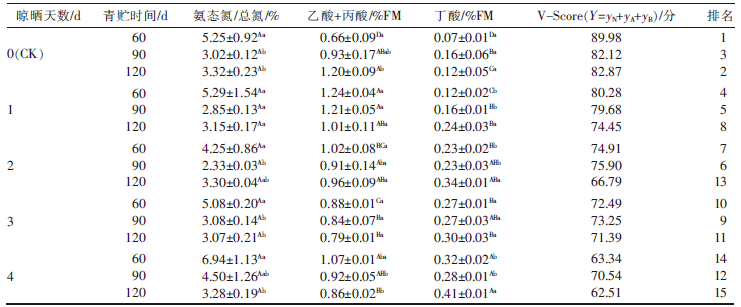| [1] |
席杰军, 梁子栋, 张钰靖, 等. 陕西关中地区31个青贮玉米品种比较试验[J]. 草地学报, 2018, 26(6):1363-1367.
doi: 10.11733/j.issn.1007-0435.2018.06.011
|
| [2] |
李松泽, 陈雪, 毋昊, 等. 2019年不同地区全株玉米青贮品质的分析[J]. 饲料工业, 2021, 42(5):60-64.
|
| [3] |
MUCK R E, NADEAU E, MCALLISTER T A, et al. Silage review: Recent advances and future uses of silage additives[J]. Journal of Dairy Science, 2018, 101(5):3980-4000.
doi: S0022-0302(18)30322-9
pmid: 29685273
|
| [4] |
高海娟, 刘泽东, 孙蕊, 等. 不同贮藏时间对苜蓿青贮品质的影响[J]. 中国饲料, 2019(23):95-98.
|
| [5] |
杨大盛, 汪水平, 贺喜全, 等. 收获期对青贮玉米青贮品质及体外发酵特性的影响[J]. 畜牧兽医学报, 2019, 50(11):2264-2272.
|
| [6] |
杨浩哲, 杨西光, 程广伟, 等. 不同收获期玉米青贮前后营养变化规律的研究[J]. 中国草食动物科学, 2013, 33(2):36-39.
|
| [7] |
刘海燕, 王秀飞, 张维东, 等. 裹包青贮的研究进展[J]. 中国奶牛, 2015(22):1-4.
|
| [8] |
内蒙古自治区市场监督管理局.青贮饲料pH值、有机酸、氨态氮测定方法:DB 15/T 1458—2018[S]. 北京: 中国标准出版社, 2018.
|
| [9] |
国家市场监督管理总局, 中国国家标准化管理委员会.饲料中粗蛋白的测定凯氏定氮法:GB/T 6432—2018[S]. 北京: 中国标准出版社, 2018.
|
| [10] |
中华人民共和国国家市场监督管理总局, 中国国家标准化管理委员会.饲料中粗灰分的测定:GB/T 6438—2007[S]. 北京: 中国标准出版社, 2007.
|
| [11] |
中华人民共和国国家市场监督管理总局, 中国国家标准化管理委员会.饲料中中性洗涤纤维(NDF)的测定:GB/T 20806—2006[S]. 北京: 中国标准出版社, 2007.
|
| [12] |
中华人民共和国农业农村部.饲料中酸性洗涤纤维的测定:NY/T 1459—2007[S]. 北京: 中国农业出版社, 2008.
|
| [13] |
余汝华, 赵丽华, 莫放, 等. 玉米秸秆青贮饲料中水溶性碳水化合物测定方法研究[J]. 饲料工业, 2003, 24(9):38-39.
|
| [14] |
闫艳红, 李君临, 郭旭生, 等. 多花黑麦草与大豆秸秆混合青贮发酵品质的研究[J]. 草业学报, 2014, 23(4):94-99.
|
| [15] |
荣辉, 余成群, 李志华, 等. 添加糖蜜和尿素对象草青贮发酵品质的影响[J]. 草地学报, 2012, 20(5):940-946.
doi: 10.11733/j.issn.1007-0435.2012.05.023
|
| [16] |
许庆方, 玉柱, 李志强, 等. 苜蓿、玉米青贮饲料有氧稳定性研究[J]. 草地学报, 2007, 15(6):519-524.
doi: 10.11733/j.issn.1007-0435.2007.06.003
|
| [17] |
高海娟, 柴凤久, 刘泽东, 等. 影响苜蓿青贮的几个关键因素[J]. 现代畜牧科技, 2015(6):38-39.
|
| [18] |
黄运青. 品种及收获期对玉米青贮品质的影响[D]. 杨凌: 西北农林科技大学, 2018.
|
| [19] |
覃方锉, 赵桂琴, 焦婷, 等. 不同添加剂对青贮燕麦品质的影响[J]. 草原与草坪, 2014, 34(1):38-43.
|
| [20] |
田健帆, 杨蔚, 唐敏, 等. 不同加工方式对青贮玉米品质的影响[J]. 草学, 2020(4):47-52.
|
| [21] |
施清平, 徐赵红, 张建国. 十个玉米品种在广州种植和青贮的潜力研究[J]. 草业学报, 2017, 26(3):175-182.
|
| [22] |
罗盈, 罗撄宁, 包锦泽, 等. 添加剂和青贮密度对玉米穗和玉米芯青贮发酵品质的互作效应分析[J]. 饲料工业, 2021, 42(6):35-37.
|
| [23] |
王彩莲, 潘发明, 宋淑珍, 等. 中性洗涤纤维在反刍动物生产中的应用综述[J]. 甘肃农业科技, 2017(11):72-74.
|
| [24] |
关皓, 郭旭生, 干友民, 等. 添加剂对不同含水量多花黑麦草青贮发酵品质及有氧稳定性的影响[J]. 草地学报, 2016, 24(3):669-675.
doi: 10.11733/j.issn.1007-0435.2016.03.028
|








